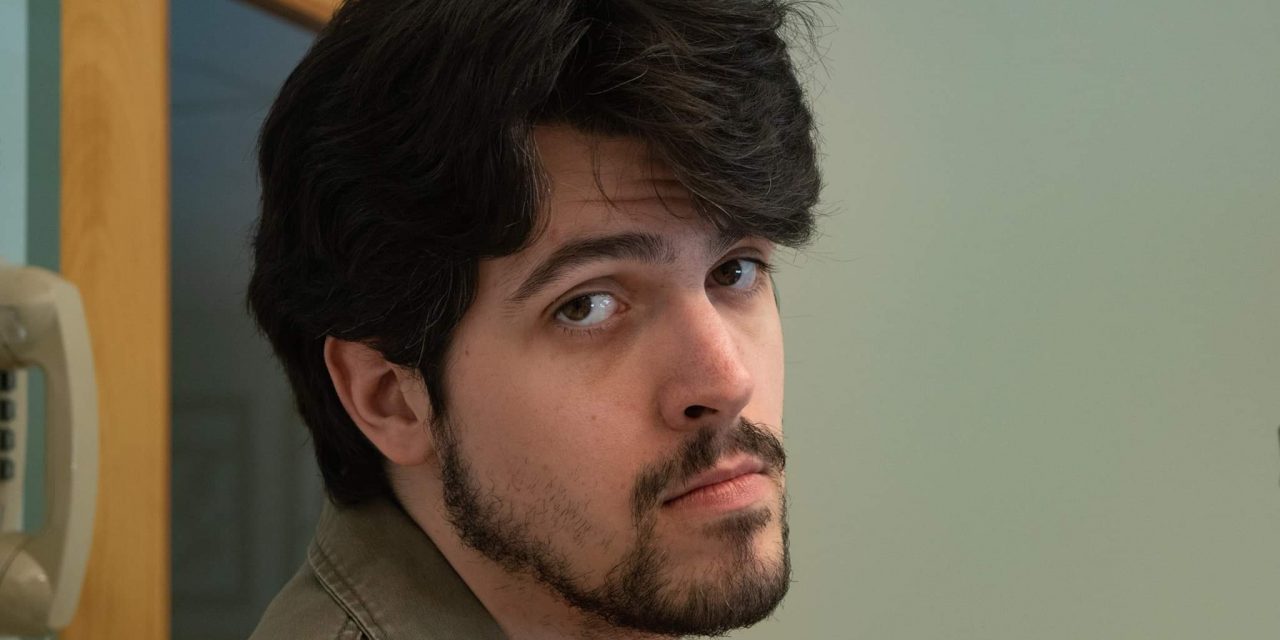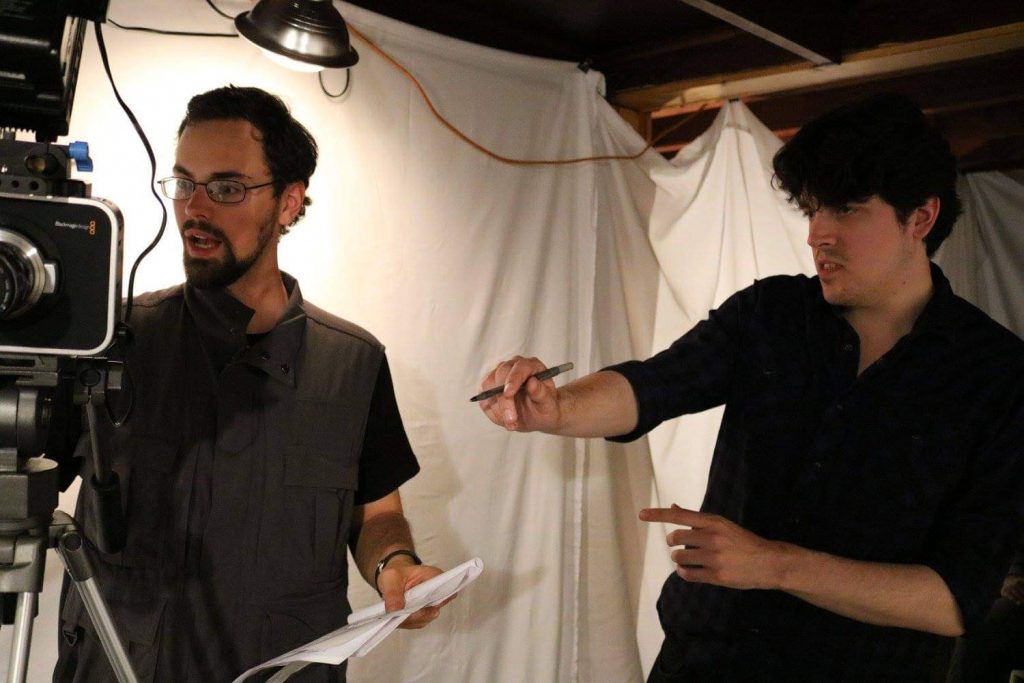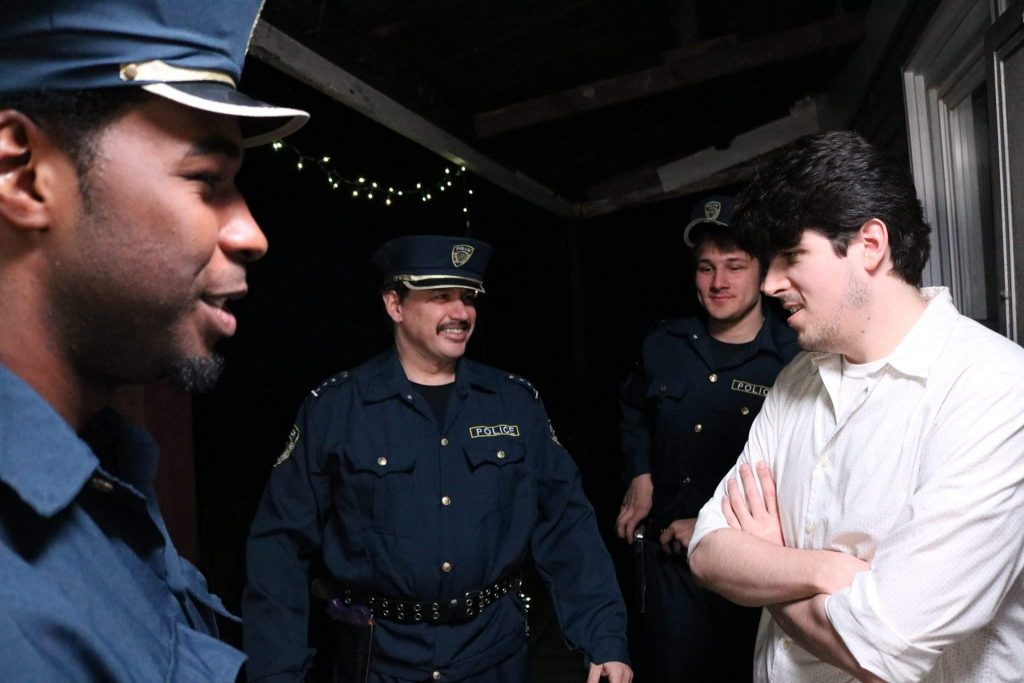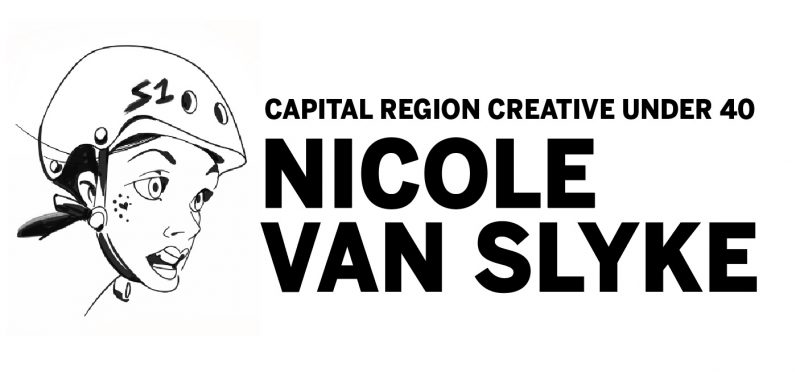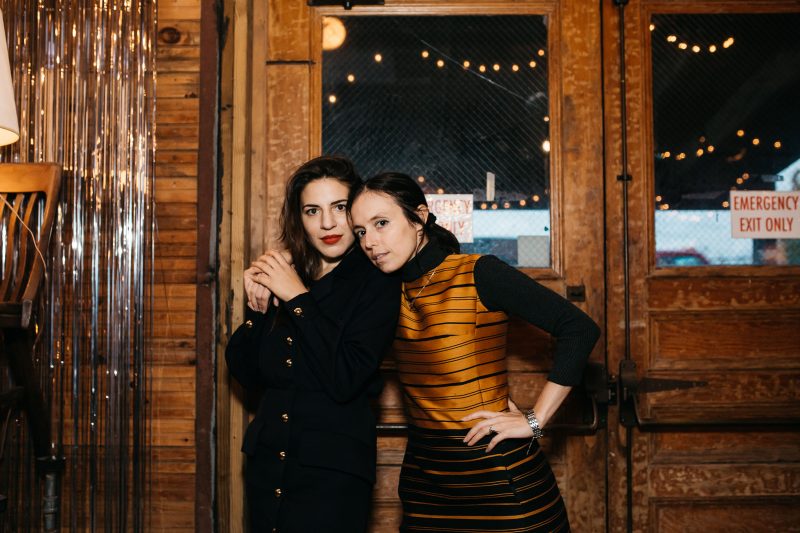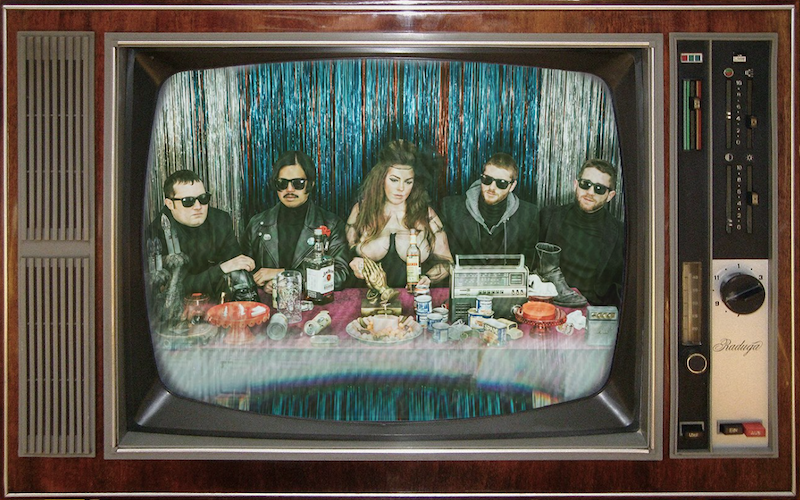Filmmaker, screenwriter, director
Age: 32
Current hometown: Albany
Current project: Completing postproduction work on his latest film, “Messy Boys”
Collaborative Media’s Maker of the Week is made possible by KeyBank.
Kyle Kleege is a largely self-taught filmmaker who excels at making horror films with striking, and often unforgettably disturbing, visuals. He and regular collaborator Charity Buckbee founded Dirty Sweater Productions in 2017. Regarding the company name, Kleege explains that he didn’t care what it was called, so Buckbee suggested he base it on his fondness for sweater-wearing — combined with the fact, on its own, he felt it “just didn’t sound filthy enough.” Before our talk this past Feb. 14, I gave myself a crash course in Kleege creations by blazing through several of his short films.
Watching your films, I’m looking for any themes that emerge; for me, there seems to be a desire to make what I might call “profound connections.” In “Static,” there are two characters trying to fuse into one. In “Hickey,” there’s the sharing of a life force. And in “The Lamb,” there’s a priest finding God through what he considers to be sinful carnal knowledge. All of them go beyond the normal experience of “boy meets girl” or “boy meets boy” and into the realm of the profound. Does that match your intention?
I think you’re right on with that… some of these movies were kind of born out of some intense trauma. Normally I try not to talk about them too in-depth, but… I think there’s a deep-seated loneliness in almost all of the films, within each of the characters. You look at Richard (Lounello’s) character in “The Lamb,” the priest. That’s a character that I think is obviously completely destroyed by this concept of sin, this concept of guilt.
I feel like none of the connections that these characters make offer any source of comfort for them. I think the happiest I’ve ever gotten is probably the ending of “Static,” and even then I’m not sure if it is happy. But it is a type of ascension. It’s just basically characters trying to ascend, transcend, do anything to get out of this type of brokenness and this loneliness that they do have. In “Hickey,” it’s essentially about a man who becomes undead, and he’s just slowly decaying. (It’s) kind of like that fear of “I don’t want to experience this kind of thing alone,” and in doing so he infects someone else, and he dooms them. And that’s horrible on so many different levels, but… I feel like “Hickey” is probably the strongest film I’ve made in terms of theme. Like I’ve made better films stylistically and technically, but that one really still hits home. It still resonates. It’s boy meets girl, boy dooms girl, both spend the rest of the film deteriorating until there’s practically nothing left of both of them.
So it’s a theme that you’ve explored multiple times in different incarnations through these stories, through these films.
Correct, yes. There’s something I was kind of trying to do, even though it was really only for me. It might sound a little highfalutin, but specifically with (those three films), I kind of liked the idea of it just being about the same character through different faces. It’s exploring the same idea.
If you look at the visuals (of “The Lamb”), it opens and closes with the same image. It’s just him, in the confession booth, with the rosary. It kind of loops back; the film’s always going to continue to loop… it’s just about, I guess you could say, nothing really ever coming from these connections. It’s not necessarily that the act of making a connection is anything inherently bad; it’s more what we bring to it that kind of dooms us in our search for connection.
Suddenly feels ironic we’re having this talk on Valentine’s Day.
Doesn’t it? (laughs)
And then of course, there’s blood. There’s lots and lots of blood, and a focus on death is present in all five of the films that I watched. Somewhere online you said you hope your films will make people “laugh, cry, and be completely grossed out.” Why does that feel important?
Well, it’s an interesting thing. When I first started making short films… originally, I would start making things and people would point it out to me like, “Wow, man, you really enjoy making films about death.” And I wasn’t really aware of it. I wasn’t aware of what I was doing at the time, and I was like, “Oh, OK, I’m getting at something here.”
Blood and violence and body horror just seemed like the natural way to explore these themes.
It sounds like you’re not just trying to gross us out for the sake of grossing us out.
I’m very much down to get confrontational and to get controversial, but it’s never about the shock… there has to be more to the violence. There has to be some weight to it.
I’ll point out “Bed Time”… it’s the weird outlier. It’s an attempt at horror and comedy in a more straightforward fashion. But the big gory scene at the end was just a way of (saying), “Hey, let’s actually show it all… it’s been all fun and games, but when the violence actually happens it should be horrifying, it should be real. It should be a near-inescapable situation.”
I would rather confront darkness head on, rather than kind of tiptoe around it and be like, “Oh yeah, I can hide it in the background and make something cutesy that suggests darkness.” I would rather just say, “You know what? No. Let’s just stare straight into this thing, and let’s just do it.”
You feel that “Bed Time” was your attempt at being more mainstream, do I have that right?
That was my attempt at it. You have that right. I don’t think I succeeded… it felt kind of impersonal, and that kind of set me on the path for “Static,” and now “Messy Boys,” which is the latest film. That’s in editing now. Both were designed to be as personal as humanly possible. “Static” is… looking at trauma through the lenses of other filmmakers, to try and create a distancing effect. Everything in that film happens through a screen and through a filter. There’s masks everywhere in that damn thing. That kind of geared me up for “Messy Boys,” which is definitely the most unique thing I’ve made.
Masks everywhere… how do you mean?
I was dealing with some really, really personal stuff on that one. I felt like, if I do this straight on, it’s going to a little too rough for me to handle. I kind of decided I’m going to reference other filmmakers’ styles, and I’m going to kind of push it in these other directions while still telling my story. It’s just giving myself something to hide behind… hiding behind the influences, to tell my own tale of fraught personal trauma.
Do you want to say who some of those other filmmakers are?
David Cronenberg is the one who always comes up, because you look at all of the special effects in that film. There’s also a bit of Tobe Hooper in there, with some of the “Poltergeist” shots and the TV static. There’s some Kiyoshi Kurosawa; he’s a Japanese director who’s done some really, really intense and “out there” horror films. He’s a little more obscure, but he’s great… those were the big three, and maybe a bit of De Palma eked in there somewhere.
Those three were very specific, like, “OK, if I set up this shot this way, if I light it like this one guy, if the composition is closer to this other guy, I can create this mutant tapestry of influence.” That also helps me learn how to better hone in on the technique… but also kind of gives me a safety net.
I hear you. You really know your stuff… did you study film?
It’s mostly self-taught. I took a couple of classes in college, but I didn’t go to film school or anything… I’ve always been kind of a home body. The area I grew up in, I grew up in a small town in Ravena and I wasn’t exactly in the best area, so I had to stay home a lot of the time.
I just watched movies constantly… I always wanted to be a writer; I didn’t even think about becoming a director. I was kind of like, “Oh man, I love movies. It’d be cool if I could write them.”
There were two movies that kind of set me on the path. There’s a movie called “Wendigo,” directed by Larry Fessenden. He’s a Hudson Valley-based filmmaker; I didn’t know it at the time. I must have been in high school when the movie came out. It was on HBO at like four in the morning, something like that… it was like a half-remembered film, but it always stuck with me. And then I saw this other movie called “House of the Devil” years later. It was a low-budget horror movie, and I kind of sat there watching it, and I’m like, “Wow. I can see how they made this movie.” It struck me like, “Oh man. Maybe it’s possible to make a film.” And then I saw Fessenden’s name attached to this thing, and that brought me back to “Wendigo” and I started going through all of his stuff. I looked through his films, and he mostly focuses on weird, personal, low-budget film… I started looking at him as the influence and the guy who I’m like, “Oh man, I could totally do this. I can do what Fessenden’s doing.”
That’s more how my education started with films. I watched them, and then I just started trying to make them with anything I had on hand.
Did you have a camera?
In high school, they had a class where they gave us camcorders; it wasn’t good equipment, but they had editing software… it wasn’t anything super in-depth, but they kind of gave us the tools, and we would just go around and mess around. Obviously, none of it’s good, but you’re learning. And then I was able to get my own camera, and I made some other things here and there. I ended up doing a roundabout thing where I kind of got away from film for a bit, and got into acting in college… that helped inform how to deal with actors. (laughs)
It’s just been kind of like nitpicking at the areas that I needed to focus on. And now here I am knowing a fair amount of stuff, and just kind of picking it up all because I wasn’t comfortable going outside as a child. Which probably shows in the movies, the detachment… the characters and the loneliness. I think it all just kind of comes full circle.
Short films seem to be your chosen canvas. Why do you gravitate toward those?
It’s mostly what I can afford to do right now. I’ve written three feature film scripts during COVID. That’s always like the end game, like I’ve got to get to features… but in order to do that, I need to hone the skills, I have to sharpen the tools, so I’ve gotta work on short films. If… maybe 10 years ago, I decided, “Hey, I’m gonna make a feature film,” it’s not gonna be very good. I don’t have access to the best equipment, and I don’t know what I’m doing. So, instead, I’ll focus on short films. The best thing about that is you have to tell a full story in as little time as possible. That’s a great challenge to yourself.
It’s like, “OK, how can I tell this story, how can I get these themes out in 15 minutes?” And even then, most of the people I work with are like, “Yeah, man, 15 minutes is still really pushing it. You should try for like eight minutes, you’ll get more festivals.”
Speaking of people that you work with, you obviously work with a lot of the same people… you have this group of people, and you use them over and over. Tell me more about what that’s like — there’s probably pros and cons to it?
It’s mostly been pros… it originally started off (as) these were the most responsible people that we worked with in auditions. Early on, you started getting people who’d show up just because they saw an acting thing; they’d never done it before. And that can go one of two ways: They’re either really serious about it, or you never hear from them as soon as the first day of shooting rolls around. It started becoming more like, “All right, I’m gonna keep using these people because they’re responsible, but also they’re really good.”
I’m probably gonna keep working with John Decker as long as I can possibly work with anyone… basically, we’ve developed a shorthand together. I barely have to talk to most of the actors I work with now… we’ll talk extensively before the shooting, but when it comes time (to shoot), they know how I work. They know the details of what’s gonna happen in the scene… I can focus on the technical and day-to-day stuff, while the actors I can let do (their) thing.
The familiarity helps (me) because I am a ball of anxiety when filming. (laughs) So I need a bit of help, and because those guys are there, and they’re completely 110 percent on the ball… it’s just so much less I have to worry about.
And it’s also kind of nice having that old-school feel. You go back to films from the 1930s and ’40s, like an old John Ford Western; you realize John Ford is using these same 10 people in every single film… you don’t see that kind of thing as much (today). It’s nice and comforting and also kind of great when actors can understand your process, and they’ll start bouncing off really good ideas to you and then you can just play around with it.
You mentioned John Decker. Is he an actor?
He is an actor… he kind of saved our lives on “Messy Boys.” When I first started writing it, I thought it was a comedy and apparently no one else did, so I don’t know what that says about me. Everyone was like, “Dude, this script is really disturbing.” I’m like, “No, it’s funny!”
I had a couple actors say they were gonna be able to play Benny, and then for one reason or another, could not handle it. That’s this one character… who’s probably the most twisted and unsettling character in the entire film. And it also was originally supposed to involve a lot of prosthetic makeup on the face to make it look they’d had extensive plastic surgery. It started scaring away people… John was playing a different role in the film, and we were very close to “go time,” to the point where we couldn’t get the prosthetics. John ended up jumping in and just nailing the character with very little time. That’s the great thing (about) having a company of players at your disposal, like they’re ready, they’re willing and they’re capable.
That’s really cool that you’ve found these people to work with, and you keep using them. So Dirty Sweater Productions is kind of like a repertory company?
Charity (Buckbee) and I started it as a company. It’s an actual LLC; we went through all the paperwork, so we’re on the books… we’ve been working and helping each other make our own films. She’s a lot better with the logistics and the business end of things, where I’m kind of like the mad scientist… (she) and my usual cinematographer, Lakota Ruby-Eck, will both kind of just stare at me, like “Why would you ever put this on camera?” So they’re usually there to talk me down from the more insane ideas. Doesn’t always work, but…
It’s a company. Eventually we would like to get into producing music videos for people, and also I would love to help produce for other people. But because we have to basically self-finance everything, there’s only so much we can do. And with COVID now, we can’t do much besides write and edit.
We do basically have like the Dirty Sweater Players… we just like to collect people and have a nice little setup. Like, hey, this person’s really good for this kind of thing — well, let’s throw ’em in! Forget auditions.
You’ve talked about COVID. I’m presuming “Messy Boys,” which you’re editing, was all filmed before the pandemic. You haven’t been able to film anything at this point, it sounds like.
No. And I personally wouldn’t want to film anything, like I wouldn’t want to put anyone in this situation, even with precautious. I wouldn’t be comfortable, and I don’t know how many other people would be comfortable with it, despite it being doable. It’s also been all right for me, because I have been spending a lot of time with “Messy Boys” now… it’s been kind of nice just being able to edit it in different ways, and (to) explore new things.
I feel like I’m the happiest when I’m in editing, where I know some directors love being on set and some love preproduction. I feel like once I have the whole thing mapped out, like it’s all in front of me, it’s all done; the hard part’s done, now I can just play around.
So during COVID, you’ve had more time than usual to do that process?
I have… my new roommate is my editor, so we ended up moving in together. Now we don’t have to wait to see to each other, it’s like, “Nope, let’s just see what we can do today.”
Now are you able to support yourself this way, or is this strictly a side project along with whatever else you do for a living?
I’ll put it this way: I’m not able to make a living off of filmmaking, but… the long-term goal is to get to the point where I can. So right now, I have a day job, and the day job is basically to support me for living, but also so I can have money for film… I like to think of my day job as my side gig.
So the fire is there; nothing’s gonna put it out. You’re not going to get exhausted from the day job and say, “You know what? To hell with filmmaking, it’s too much work.” It’s the other way around.
Exactly. If I’m getting exhausted of anything, it’s the day job!
The fire’s burning, and the scary thing is wandering into whatever the film world’s going to be, post-COVID. The theatrical model, I don’t know if that’s really gonna survive this. Granted, it’s gonna become way easier to get your films distributed, but it’s going to become a lot harder getting them seen. And therefore, it’s gonna become a lot harder being able to get the next project made and being able to (make) a living.
You think we won’t be going to the movie theaters anymore?
If we do, it’s gonna be one of two things. Like the small theaters are gonna have to become like The Madison; they’re gonna have to do dinner theaters where you’re there for more reason than film, you’re there for the gimmick of “I’m going to have dinner and a movie, and alcohol during the movie.” There has to be a gimmick for that, and that’s how I feel a lot of smaller theaters are going to survive.
But your big multiplexes — some of them are gonna survive because Marvel needs an outlet. So that’s gonna be fine. And if Disney purchases all of the big theaters, then that’s the unfortunate truth of blockbuster filmmaking from here on out.
I don’t know about you, but I really love the Spectrum theater on Delaware Avenue. If there’s anything I miss, it’s that.
I hear you. And I absolutely want that to come back.
Find our Maker online: Facebook, Instagram; videos available on Amazon Prime and Gumroad
Wish to nominate a Maker of the Week? Email nominations.

